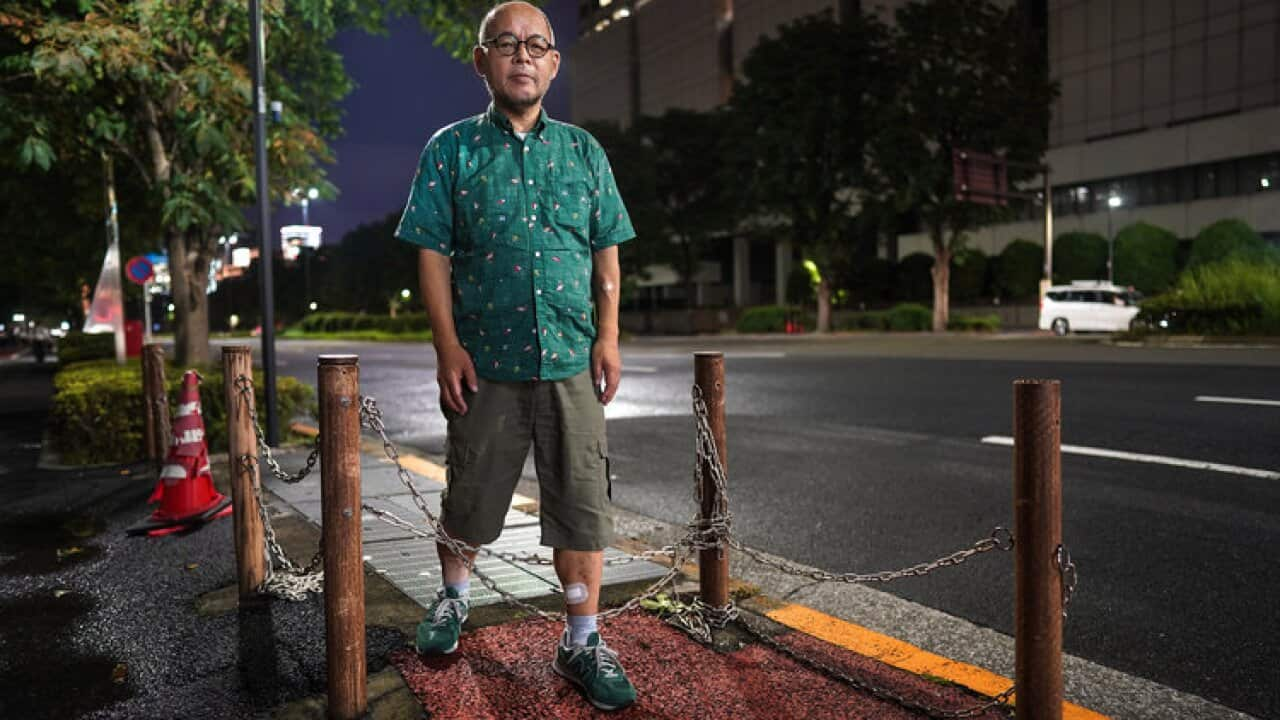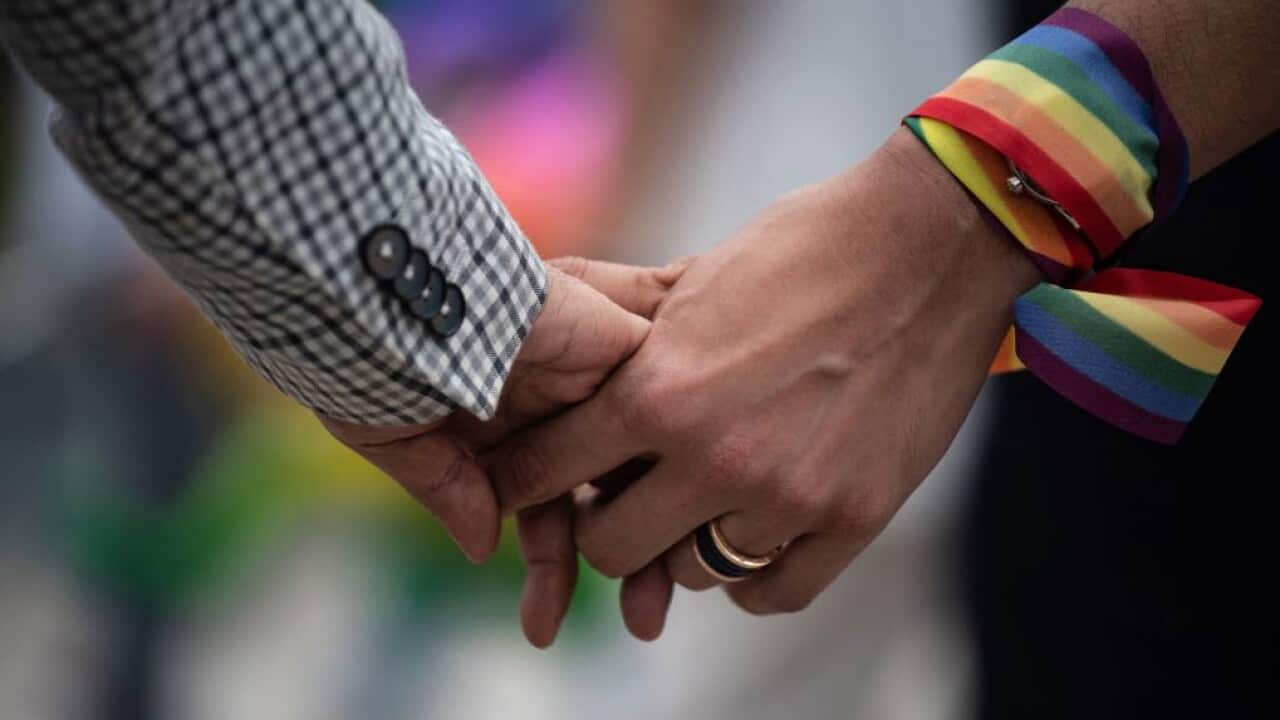Ikuo Sato stood in front of a Tokyo court In April and told the world he was gay.
To a packed room, he described the anxiety he had felt as a young man, struggling to express his sexuality in Japan’s restrictive society.
If the law is changed to allow same-sex marriage, he said, perhaps “we’ll make a society where the next generation doesn’t have to feel that way.”
Somewhere in the courtroom, his partner sat silently watching, hoping to go unnoticed.
His family and co-workers do not know he is gay, and he hopes — at least for now — to keep it that way, fearing discrimination in his workplace.
The couple’s story epitomises the contradictions that shape the lives of gay people across Japan. In many ways, there has been dramatic change.
In many ways, there has been dramatic change.

Haru Ono, left, and Asami Nishikawa at their home in Tokyo. Source: Chang W. Lee/The New York Times
Lawsuits filed this year by Mr Sato, his partner and five other couples seeking recognition of same-sex marriage are the first of their kind in Japan.
Public support for same-sex marriage has surged in the last few years, making it seem suddenly within reach.
Local governments are increasingly recognizing same-sex partnerships, and even Japan’s famously rigid companies have begun coming out in favour of them.
Yet in other ways, the gains remain abstract.
Gay people face overwhelming pressure to conform to the silent, stifling norms of a society in which many parents and workers are still uncomfortable with the idea of their own children and colleagues being gay.
And the conservative politicians who run the country and extol its sometimes inflexible culture refuse to touch the issue.
“The Japanese people think we should recognise same-sex marriage,” said Taiga Ishikawa, who in July became the first openly gay man elected to the country’s Parliament.
But, he said, some politicians in the governing party “still have outdated views on this,” adding that there is a mistaken belief “that same-sex relationships are a ‘hobby’ or will add to the declining birthrate.” A recent poll reflected the dichotomy.
A recent poll reflected the dichotomy.

Makiko Terahara, an Attorney of Law in Tokyo. Source: Noriko Hayashi for The New York Times
The survey, by advertising giant Dentsu, found that more than half of gay men and lesbians in Japan were concerned about coming out. Yet it also showed that almost 80 per cent of people 60 and under now support same-sex marriage.
That widespread backing, a jump of 20 or more points in just a few years, comes as Japan has caught up with patterns in other developed countries and has experienced what many describe as a “boom” in LGBT awareness.
Advocates see the groundswell in support as an opening.
Haru Ono, an illustrator and rights activist, and her partner, Asami Nishikawa, who are in their 40s and live together in a Tokyo suburb, have long thought it was unfair that they could not marry.
But they kept their activism quiet, fearing that making their relationship public could expose their children — who are now grown — to bullying at school.
A run-in with a hospital changed all that. When Ms Nishikawa brought one of Ms Ono’s children in for a procedure, the staff refused to allow her to check the boy in, saying that he needed to be accompanied by a member of his “real family.”
The experience “haunted me for a long time,” Ms Ono said. Her anxiety only grew when she learned she had breast cancer and began to fear that her partner might not be allowed to be with her as she underwent treatment.
For years, Ms Ono said, lawyers had told the couple that “the time wasn’t right” to sue the government for the right to marry.
Then, suddenly, it was. In February, they joined the 12 other couples across Japan in filing lawsuits. Others have since followed.
A galvanising moment had come the previous summer. In an interview with Shincho 45, a conservative magazine, a lawmaker, Mio Sugita, dismissed gay men and lesbians as “unproductive” members of society who would not bear children.
Ms Sugita speculated that recognising same-sex marriage could cause Japan to collapse as it faces a growing population crisis.
The remarks were widely publicised, raising awareness of discrimination against gay people, said Alexander Dmitrenko, a Canadian lawyer and resident of Tokyo who has been a prominent advocate of same-sex marriage.
“It was like Japan’s Stonewall,” he said, referring to the 1969 police raid and following protests that set off the gay rights movement in the United States.
When Taiwan approved Asia’s first same-sex marriage law this May, he said, it was a further prod for many Japanese, who have long prided themselves on being the leading democracy in the region.
Noting the country’s LGBT “boom,” Kazuya Kawaguchi, a sociology professor at Hiroshima Shudo University, pointed to two television dramas featuring the lives of gay men — “Ossan’s Love” and “What Did You Eat Yesterday?” — that became surprise hits this summer. Four episodes of “Queer Eye” were also set in Japan.
The television dramas “improved people’s impressions of gay couples,” Mr Kawaguchi said, adding that “the way they were shot, the language, were easy to understand.”
At the same time, attitudes have been changing among Japanese companies as they have embraced gay consumers and steadily increased their support for gay employees.
Still, many of them have stopped short of becoming involved in the politics of same-sex marriage.
In September 2018, the American Chamber of Commerce in Japan issued a position paper arguing that legalising same-sex marriage would make the country more attractive for talent from abroad. Sixty-seven organisations have signed on to the statement, but so far only a handful have been Japanese firms, including Panasonic and building materials manufacturer Lixil.
While domestic media coverage of changing norms abroad has “contributed to a huge amount of discussion here, very few people in the Japanese corporate workplace or in family situations feel comfortable coming out,” said Laurence Bates, 63, who became one of the few openly gay directors of a major Japanese company last year when he was appointed to Panasonic’s board.
The mixed feelings are evident in statistics from the 26 localities that recognise same-sex partnerships. As of October, only 617 couples had registered their partnerships, according to Nijiiro Diversity, a nonprofit that fights discrimination against gay people in the workplace. Advocates note, however, that the process involves considerable red tape and delivers few concrete benefits.
On the national level, the governing Liberal Democratic Party has refused to deliberate a bill proposed by opposition parties that would change Japan’s civil code to recognise same-sex marriages.
The party insists that legalising the unions would require changing the country’s Constitution: Article 24 of the document says that “marriage shall be based only on the mutual consent of both sexes,” language that conservative lawmakers have interpreted as requiring the participation of one man and one woman.
That argument, however, has already begun to show weaknesses. The Japan Federation of Bar Associations has rejected the position, and in September, a local court became the first in Japan to recognise two people of the same sex as being in a common-law marriage. In the ruling, in which a woman whose female partner had an affair was awarded damages, the judge said that Article 24’s wording did not prohibit unions between same-sex partners.
The lawyers fighting on behalf of Mr Sato, Ms Ono and the other couples hope that their lawsuits will make it even harder for the government to continue making its claim.
It could be several years, though, before the courts issue a judgment, said Makiko Terahara, the lead lawyer on the case and a director of Marriage for All Japan, a nonprofit organisation.
“It’s an important tool, but of course it’s better if the Diet were to make same-sex marriage a reality by changing civil law first,” she said, referring to the national Parliament.
For the couples, a change in the law cannot come soon enough.
“The No. 1 reason I thought I had to participate in this lawsuit was that I wanted to show my children that it’s OK that we’re a family,” Ms Ono said.
By Ben Dooley © 2019 The New York Times


